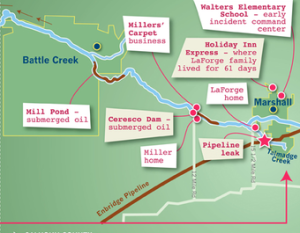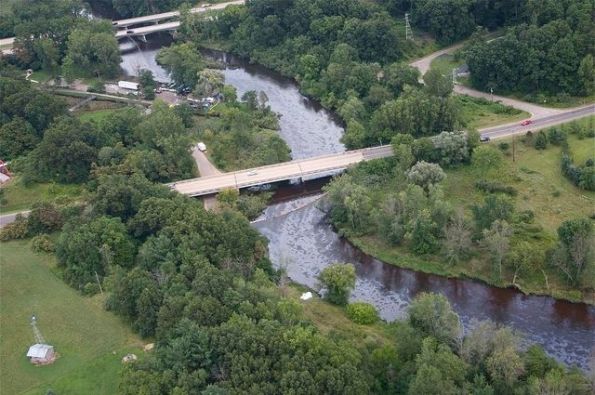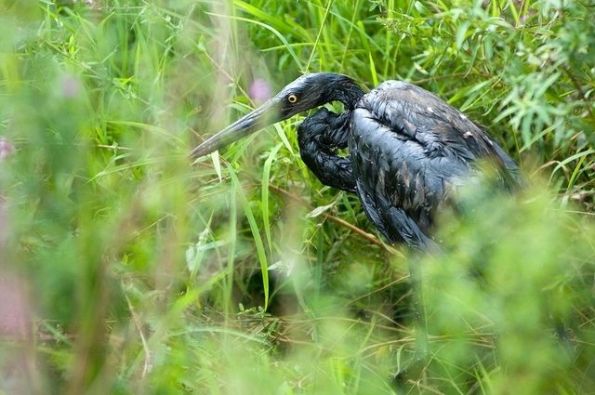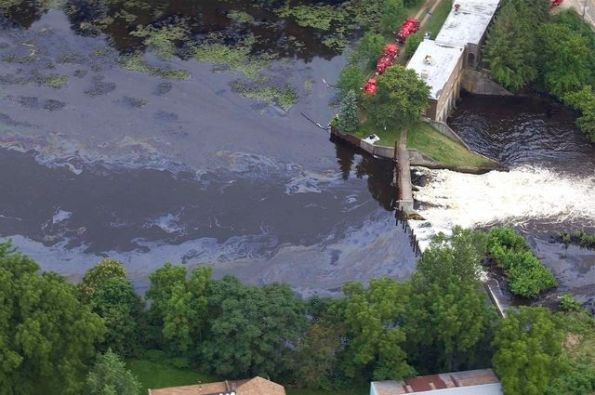Archive
Earthgauge News – Oct. 15, 2017
Edition #2 of the new podcast Earthgauge News for the week of Oct. 15, 2017.
A weekly Canadian environmental news podcast featuring the top environmental stories from across Canada and around the world.
Join us here every week or subscribe in iTunes or your favourite podcast catcher.
Earthgauge wins 2013 National Community Radio award!
I am thrilled to announce that I was recently awarded a 2013 National Community Radio Association (NCRA) award as the best Current Affairs / Magazine show for my coverage of the Forward on Climate rally in Washington D.C. in February of this year. Click the audio player above to hear a 10-minute sample of the program or click the link below to listen to the full one-hour show.
This show featured speeches and interviews from the huge demonstration in which roughly 40-50,000 people gathered on Washington’s national mall to urge President Obama to follow through on the commitments he made during his inaugural address in January to respond to the climate change crisis. This included speeches by Van Jones of Rebuild the Dream, Bill McKibben of 350.org, Michael Brune, executive director of the U.S. Sierra Club, and Jacquie Thomas of the Saik’uz First Nation in B.C., and interviews from the rally with Michael Brune and Canadian author/ activist Naomi Klein.
Click here to check out Earthgauge’s award-winning coverage of ‘Forward on Climate!’
EG Radio May 9: the Kalamazoo River oil spill 3 years later

Photograph: State of Michigan
This week on Earthgauge, we take a look back at what happened in Michigan in 2010 when an Enbridge pipeline ruptured spilling roughly 1 million gallons of oil into the Kalamazoo River. What is the legacy of the spill and is there anything for the rest of us to learn as we debate the construction of more pipelines from the tar sands of Alberta to B.C. and the Gulf of Mexico?
I have 3 interviews on the program today:
- Susan Connelly, a local resident of Marshall, MI where the spill occurred
- Jeff Insko, founder of the Line 6B citizen’s blog, a web site for residents who have pipelines running directly beneath their property
- Josh Mogerman, spokesperson for the Natural Resources Defence Council
We’ll also have our usual update from Kathy of Ecology Ottawa on local environmental events and campaigns.
Click the audio player above to stream the show or right click here to download.
Thanks to a fellowship from the Institute for Journalism and Natural Resources, I had the opportunity to travel to Kalamazoo and the surrounding area last week to learn about the Kalamazoo River and, in particular, the Enbridge oil spill of 2010.

On Sunday, July 25, 2010, Enbridge Line 6B ruptured near Marshall, Mich. and released more than one million gallons of tar sands diluted bitumen into Talmadge Creek and the Kalamazoo River. Illustration by Catherine Mann for InsideClimate News.
Remember that one? It happened on July 25 just a couple weeks after BP finally sealed their leak in the Gulf of Mexico following the explosion of the Deep Water horizon oil rig that killed 11 workers.
Six inches of rain fell in the days after the Enbridge pipeline spill, raising Talmadge Creek and the Kalamazoo River into “a roiling brown torrent that overflowed its banks by several feet,” according to the seven-month, Pulitzer prize-winning investigation conducted by InsideClimate News. Talmadge Creek, which is usually five to six feet wide and a foot deep, stretched 100-feet wide after the downpour.
The spill occurred in Marshall, a community of 7,400 in southwestern Michigan. It drove 150 families permanently from their homes, yet the media spotlight never settled on their story — perhaps in part because this spill occurred 10 days after BP Plc’s Macondo well was finally capped after three months of spewing oil into the Gulf of Mexico.
Enbridge Energy Partners, a U.S. affiliate of Enbridge Inc., operated the pipeline. The company has spent more than $765 million cleaning up the spill.
Oiled sections of the Kalamazoo River reopened to the public in June 2012 — 23 months after the spill.

Photograph: State of Michigan
On today’s special show, we hear a couple different perspectives from residents who have been affected by the spill and its aftermath. First up is Susan Connelly, a local resident who was living near the oil spill when it occurred. Her kids daycare was just a half mile away so she tells us about some of the health effects her family and her community suffered immediately following the spill and in the intervening 3 years.
Susan Connelly (right click here to download):
Next we hear from another local resident Jeff Insko who started the Line 6B citizen’s blog. After the rupture of the pipeline known as line 6B, Enbridge decided to replace a huge section of pipe through Michigan, some of which runs through the property of local residents. Jeff will tell us why he has been less than satisfied in his dealings with Enbridge as they exercised their legal authority to do dig up his property and cut down all his trees in order to install new pipe. Will his experience be echoed by many other property owners as new pipelines are constructed in the coming years across North America?
Jeff Insko (right click here to download):
Finally, we hear from Josh Mogerman of the Natural Resources Defense Council on why he feels tar sands oil is much more difficult and problematic to transport through pipelines than conventional crude and how this may have played a role in the Kalamazoo spill.
Josh Mogerman (right click here to download):
First though, to get some context on what actually happened in the summer of 2010, we hear a piece from The Rachel Maddow Show on MSNBC, which was broadcast in July 2012 following the release of the US National Transportation Safety Board’s scathing report about Enbridge’s handling of the spill and their mistakes leading up to it.
Why does a pipeline rupture in Michigan matter? Well, because many plans are afoot for new pipelines from the tar sands of Alberta, including proposals through the US in the form of the Keystone XL pipeline and to the west coast of B.C. with the Northern Gateway pipeline. So today we’re going to find out about the experiences of local residents looking back 3 years later at the Kalamazoo River spill in 2010. Let’s hope we’ve learned our lessons and don’t repeat the mistakes of Kalamazoo as we debate the merits of constructing new pipelines across North America to extract even more tar sands oil at ever increasing rates.

Photograph: State of Michigan

Photograph: State of Michigan

Photograph: State of Michigan
Tomorrow on EG Radio: the Kalamazoo River oil spill

This week on Earthgauge, we’ll take a look back at what happened in Michigan in 2010 when an Enbridge pipeline ruptured spilling roughly 1 million gallons of oil into the Kalamazoo River. What is the legacy of the spill and is there anything for the rest of us to learn as we contemplate the construction of more pipelines from the tar sands of Alberta to B.C. and the Gulf of Mexico?
I was in Kalamazoo and the surrounding area last week and I had the opportunity to speak with residents who have been affected by the spill and its aftermath. First we hear from Susan Connelly, a local resident who was living near the site of the spill when it occurred. Her kids’ daycare was just a half mile away so she’ll tell us about some of the health effects her family and her community suffered following the spill and in the intervening 3 years.
Next we’ll hear from another local resident, Jeff Insko, who started the Line 6B citizen’s blog. After the rupture of the pipeline known as line 6B, Enbridge decided to replace a huge section of pipe through Michigan, some of which runs beneath the property of local residents. Jeff will tell us why he has been less than satisfied in his dealings with Enbridge as they exercised their legal authority to dig up his land and cut down his trees in order to install their new pipe.
We’re also going to get an overview of the incident from Rachel Maddow of MSNBC who did a feature last summer when the US National Transportation Safety Board issued a scathing report about Enbridge’s handling of the spill and their mistakes leading up to it.
Of course we’ll also have our usual update from Kathy of Ecology Ottawa on local environmental events and campaigns. That’s at around 7:50.
Tune in tomorrow!
EG Radio March 28: Federal Budget 2013, urbanization in Kenya and the tar sands “staples” trap
We love covering local stories on Earthgauge and this week, we get just about as local as we can, focusing on some compelling environmental research taking place at Carleton University in Ottawa. We also take a look at the environmental provisions of last week’s federal Budget 2013. We have 3 interviews on today’s show:
- Glennys Egan on the environmental and human impacts of urbanization in Kenya
- Brendan Haley on the tar sands “staples trap”
- Andrew Van Iterson on the environmental measures in Budget 2013
We also have our usual update from Kathy of Ecology Ottawa on local environmental events and campaigns.
Click the audio player above to stream the show or right click here to download.
Part 1 – Budget 2013
Right click here to download.
To kick off the program this week, I speak with Andrew Van Iterson who is the manager of the Green Budget Coalition. Environmental funding in last week’s 2013 federal budget had very little in the way of environmental provisions. Sustainable Development Technology Canada, a government-funded venture capital firm that invests in environmental technology firms, will get $325 million over eight years and there is some funding for municipal projects, notably the City of Ottawa’s new wastewater holding tanks. But the green measures are pretty slim beyond that. The Green Budget Coalition, founded in 1999, brings together sixteen leading Canadian environmental and conservation organizations, which collectively represent over 600,000 Canadians, through our volunteers, members and supporters. They make an annual set of recommendations to the federal government regarding strategic fiscal and budgetary opportunities.
Part 2 – Glennys Egan
Right click here to download.
Next up Earthgauge contributor Juanita Bawagan speaks with Glennys Egan who is a Masters student in the African Studies program at Carleton whose research is based on issues of urbanization in Kenya. She has recently been in Kenya working with a community organization through Street Kids International based in a Nairobi slum and she tells Juanita about her research and experiences there, and the environmental and human impacts of urbanization in Kenya.
Part 3 – Brendan Haley
Right click here to download.
In the second half hour, I speak with Brendan Haley who is a PhD student at Carleton’s School of Public Policy and Administration and a fellow of the Broadbent Institute. He co-authored a recent study called ‘The Bitumen Cliff’ warning that the poorly regulated bitumen industry is creating a double threat to Canada: a so-called “staples trap,” with an economy over-reliant on bitumen exports, and a “carbon trap,” locking Canada into fossil fuels instead of adapting to climate change. The report was co-authored by the Canadian Centre for Policy Alternatives and the Polaris Institute.
Earthgauge Radio airs every Thursday morning at 7:00 AM on CKCU 93.1 FM in Ottawa and online around the world at www.ckcufm.com. Ottawa’s only radio program dedicated exclusively to environmental news and commentary from Ottawa, across the country and around the world. Podcasts on iTunes and right here on earthgauge.ca.
EG Radio February 28 2013: ‘Forward on Climate’ special with Bill McKibben, Van Jones, Naomi Klein, Michael Brune and Jacquie Thomas
 This week on Earthgauge, we hear speeches and interviews from the huge ‘Forward on Climate‘ rally in Washington D.C. on February 17. We have speeches by Van Jones of Rebuild the Dream, Bill McKibben of 350.org, Michael Brune, executive director of the U.S. Sierra Club, and Jacquie Thomas of the Saik’uz First Nation in B.C., and interviews from the rally with Michael Brune and Canadian author/ activist Naomi Klein. We also have our weekly update from Kathy of Ecology Ottawa on local environmental events and campaigns in the Ottawa area.
This week on Earthgauge, we hear speeches and interviews from the huge ‘Forward on Climate‘ rally in Washington D.C. on February 17. We have speeches by Van Jones of Rebuild the Dream, Bill McKibben of 350.org, Michael Brune, executive director of the U.S. Sierra Club, and Jacquie Thomas of the Saik’uz First Nation in B.C., and interviews from the rally with Michael Brune and Canadian author/ activist Naomi Klein. We also have our weekly update from Kathy of Ecology Ottawa on local environmental events and campaigns in the Ottawa area.
Click the audio player above to stream the show or right click here to download.
Forward on Climate!
I was fortunate to have the opportunity to cover the huge Forward on Climate rally organized by 350.org, the Sierra Club, the Hip Hop Caucus among others. Roughly 40-50,000 people gathered on Washington’s national mall to urge President Obama to follow through on the commitments he made during his inaugural address in January to respond to the climate change crisis.
The protesters’ demands included urging Obama to reject the controversial Keystone XL pipeline, which if constructed would carry tar sands crude from northern Alberta through the U.S. to refineries in the Gulf of Mexico. Organizers of the event called it the largest climate rally anywhere in history. Among the many displays and banners was a mock pipeline that read “separate oil and state”. The Rev. Lennox Yearwood who MC’d the event compared it to Dr. Martin Luther King’s 1963 march on Washington for civil rights. Following the speeches at the Mall, the protesters began their march through the streets of Washington to the White House. It was really an incredible sight to behold: thousands of people young and old carrying banners, chanting, singing and making a lot of noise in what was the largest climate change protest in history and the largest environmental protest in Washington in decades.


Jacqueline Thomas of the Saik’uz First Nation in B.C.

Van Jones


D.C. at dusk after the protest
Following the rally, I had some time to visit the National Museum of African American History at the Smithsonian Institute where I came upon a quotation by the abolitionist Frederick Douglass. “Power concedes nothing without a demand. It never did and it never will.” So whatever you may think of the campaign to stop Keystone XL, it would appear that climate change activists around the world are beginning to wake up to the cold reality of Douglass’ words. We may well look back upon last weekend’s protest as only the beginning of a long, bitter and increasingly hostile battle.
Earthgauge Radio airs every Thursday morning at 7:00 AM on CKCU 93.1 FM in Ottawa and online around the world at www.ckcufm.com. Ottawa’s only radio program dedicated exclusively to environmental news and commentary from Ottawa, across the country and around the world. Podcasts on iTunes and right here on earthgauge.ca.
Will John Kerry reject Keystone XL?
A very interesting post today by Joe Romm at ThinkProgress.org. Based on the recent comments of the new U.S. Secretary of State, John Kerry, Romm is speculating that Kerry “shows no sign whatsoever of backing down from the moral urgency that has made him a true climate champion.” Click the video link above to see Kerry’s first big foreign policy speech in which he says the following:
We as a nation must have the foresight and courage to make the investments necessary to safeguard the most sacred trust we keep for our children and grandchildren: an environment not ravaged by rising seas, deadly superstorms, devastating droughts, and the other hallmarks of a dramatically changing climate.
As Romm writes, “Does this sound like a man who is going to launch his term as Secretary of State approving the expansion of one of the dirtiest sources of fossil fuels in the world? His repetition of the word “courage” makes it sound like he is talking directly to the President.”
Remember that the U.S. State Department, under Kerry’s leadership, must give its approval to Keystone XL (because it crosses an international border) before the project can proceed.
EG Radio January 31 2013: Obama and climate change | Lisa Friedman | Idle No More
This week on Earthgauge Radio, we’re talking about President Obama’s new commitment to climate change, the growing problem of environmental “refugees”, and the environmental dimensions of the Idle No More aboriginal movement. We have 3 interviews on today’s show:
- Lisa Friedman, Deputy Editor of ClimateWire
- Stephen Hazell, environmental lawyer and the founder of Ecovision Law
- John Smol, biology professor at Queen’s University and Canada Research Chair in Environmental Change
U.S. President Barack Obama’s inaugural address last week gave special prominence to taking action on climate change. Will this translate into concrete action and what does this mean for Canada? Today we take a look at what Obama can actually accomplish and what he won’t be able to do given the fierce resistance of some members of Congress and of course the fossil fuel lobby in Washington. We speak to journalist Lisa Friedman of ClimateWire about the international climate change situation, what Obama is up against in the coming four years, and the growing problem of climate and environmental “refugees”.
Lisa Friedman interview (right click here to download):
Also on the program today Earthgauge contributor Juanita Bawagan gives us a primer on the changes to the Navigable Waters Protection Act and the overhaul of the Canadian Environmental Assessment Act. It’s been said that these and other fundamental changes to environmental legislation and regulations in Canada have been at least partially responsible for fuelling the Idle No More movement that has galvanized Aboriginal Canadians right across the country. Juanita will explain why many First Nations are so upset with what the Harper government has done to environmental protections in Canada.
Also on the program we have our usual update from Kathy of Ecology Ottawa on local environmental events and campaigns.
Earthgauge Radio airs Thursday mornings from 7-8 AM on CKCU 93.1 in Ottawa. Podcasts on iTunes and earthgauge.ca. Stream live on www.ckcufm.com. Check out our Facebook page at www.facebook.com/EarthgaugeRadio where we post environmental news stories from around the world.
Right click here to download today’s show.
Earthgauge Radio January 17: Keith Stewart of Greenpeace and Alex Hebert of SwitchHop.com
Earthgauge Radio returns this week with Keith Stewart of Greenpeace who will tell us about the December 2011 letter he obtained through an Access to Information request from oil companies to the Harper government requesting changes to some of Canada’s environmental laws. And with the omnibus Budget Bills of the last year, Stewart says that Canada’s Conservative government was more than happy to oblige.
We also talk to Alex Hebert of SwitchHop to learn how you can reduce energy consumption in your home (and your energy bill!) with an amazing new online tool that tracks your energy use in real-time.
Alex Hebert (right click here to download):
We also hear a 2012 extreme weather report from Alex Smith of Radio EcoShock and we have our usual update on local environmental events and campaigns from Ecology Ottawa.
Earthgauge Radio airs Thursday mornings from 7-8 AM on CKCU 93.1 in Ottawa. Podcasts on iTunes and earthgauge.ca. Stream live on www.ckcufm.com. Check out our Facebook page at www.facebook.com/EarthgaugeRadio where we post environmental news stories from around the world.
Right click here to download today’s show.
Earthgauge Radio September 13, 2012: From the frontlines of the Northern Gateway pipeline struggle
I’m excited to be back at CKCU to kick off the second season of Earthgauge Radio! On this the September 13 edition of the program, we hear a couple of interviews live from the frontlines of the Northern Gateway pipeline struggle in B.C. On the show today:
- Art Sterritt – Executive Director for the Coastal First Nations Great Bear Initiative
- Rafe Mair – former BC Cabinet Minister and popular radio talk show host
I visited British Columbia a couple weeks ago and had the opportunity to speak with a number of individuals who are actively engaged in the movement to stop Enbridge from building a twin pipeline from the tar sands of northern Alberta to the coastal B.C. port of Kitimat. Having just returned I can tell you that this issue is really heating up and will only become more so in the months to come.
It’s been an eventful summer with the premiers of Alberta and B.C. publicly squabbling over Northern Gateway, media baron David Black proposing to build a $13 billion oil refinery to process tar sands bitumen in Kitimat, and the resumption of public hearings that are taking a closer look at the controversial project. Northern Gateway is indeed becoming a defining battle not only for Canada’s environmental movement but for the very energy future of this country. Given the high stakes not just for BC and Alberta but for the entire country, I thought this would be a good place to kick off our second season of Earthgauge Radio.
I have two interviews on today’s program. First we hear from Art Sterritt – Executive Director of the Coastal First Nations Great Bear Initiative who will explain why First Nations along the BC coast are so opposed to the Northern Gateway proposal and how Aboriginal opposition may well prove to be an insurmountable obstacle for Enbridge and the Harper government to overcome in the efforts to build this pipeline.
We also hear from a former BC Environment Minister and well-known radio talk show host Rafe Mair. Having worked inside the provincial government at the highest levels, Mair knows very well how politicians, bureaucrats and corporations will try to sell unpopular ideas to a skeptical public so you’ll want to stay tuned to hear what he has to say about this.
Earthgauge Radio is broadcast every Thursday morning at 7:00-8:00 AM on CKCU 93.1 FM in Ottawa. Online at www.ckcufm.com with podcasts on iTunes. ‘Like’ us at www.facebook.com/EarthgaugeRadio.